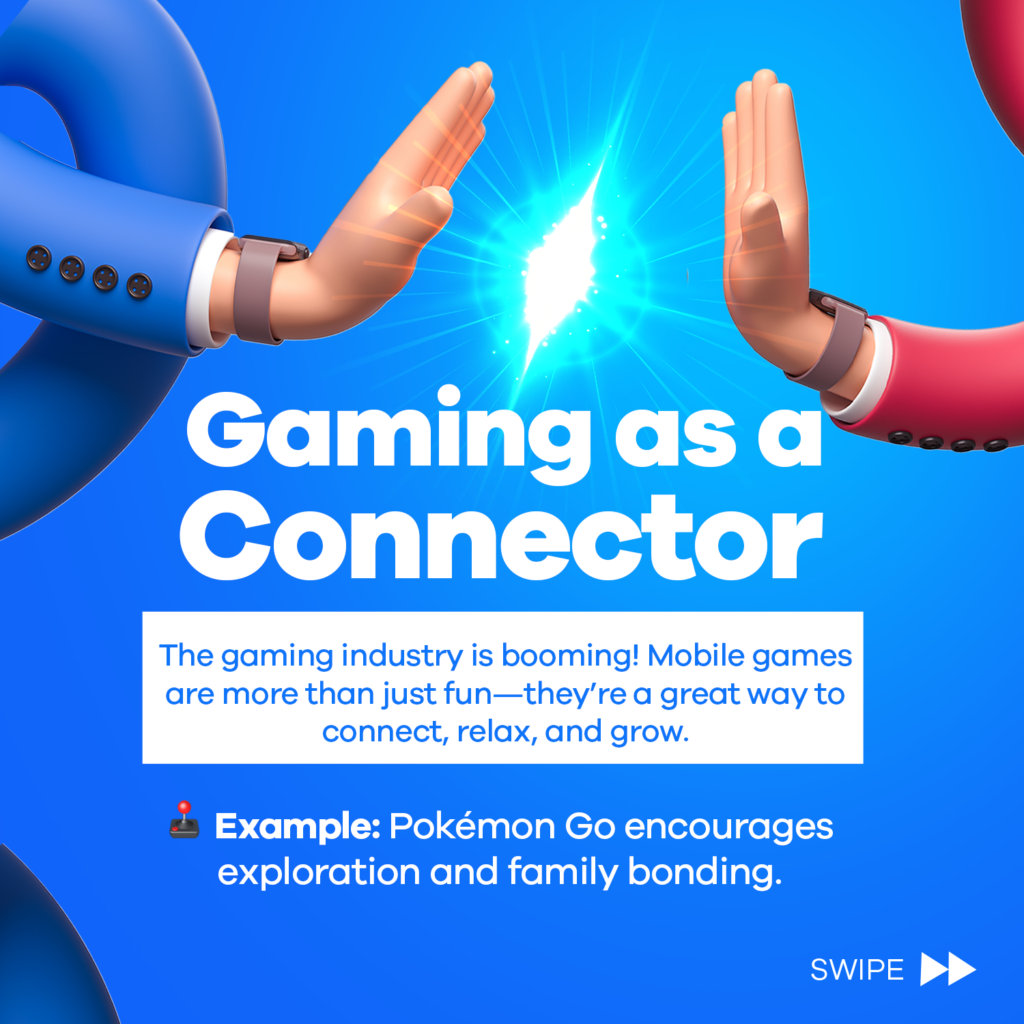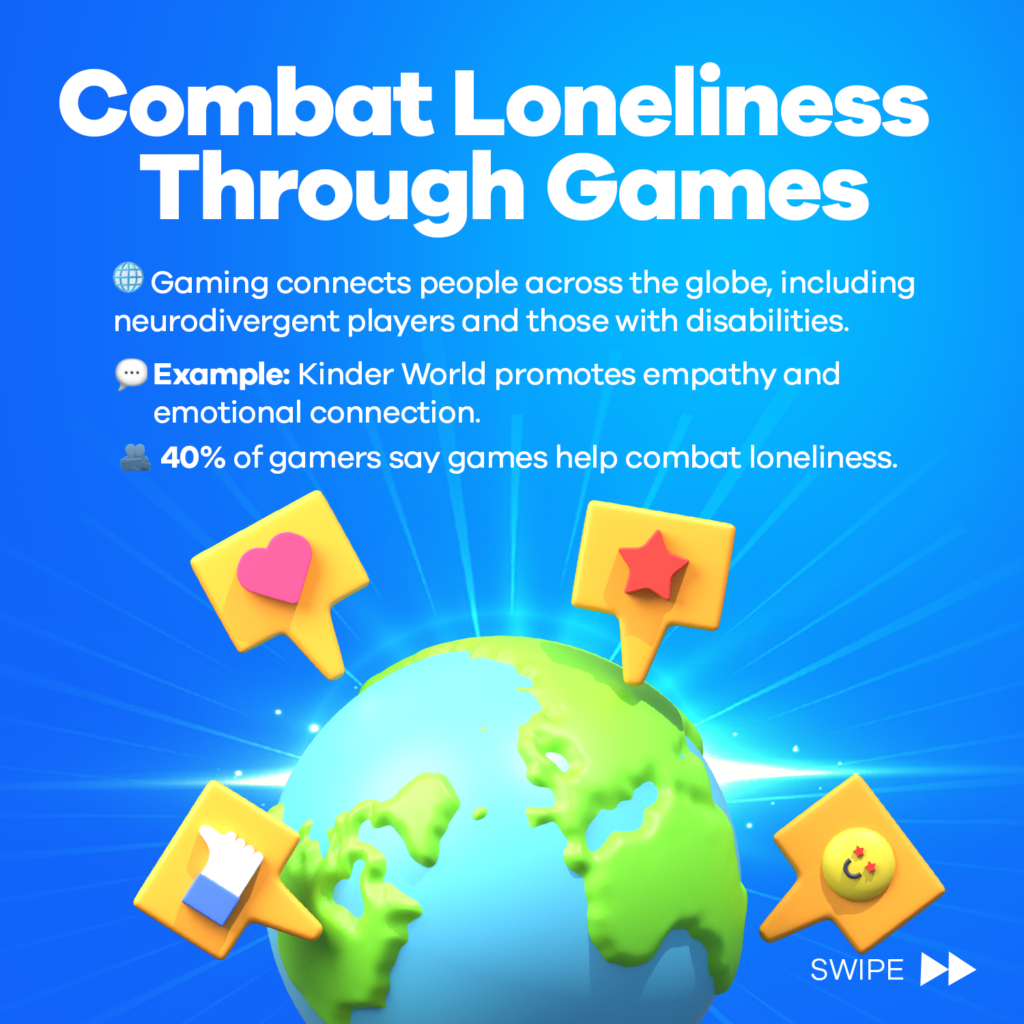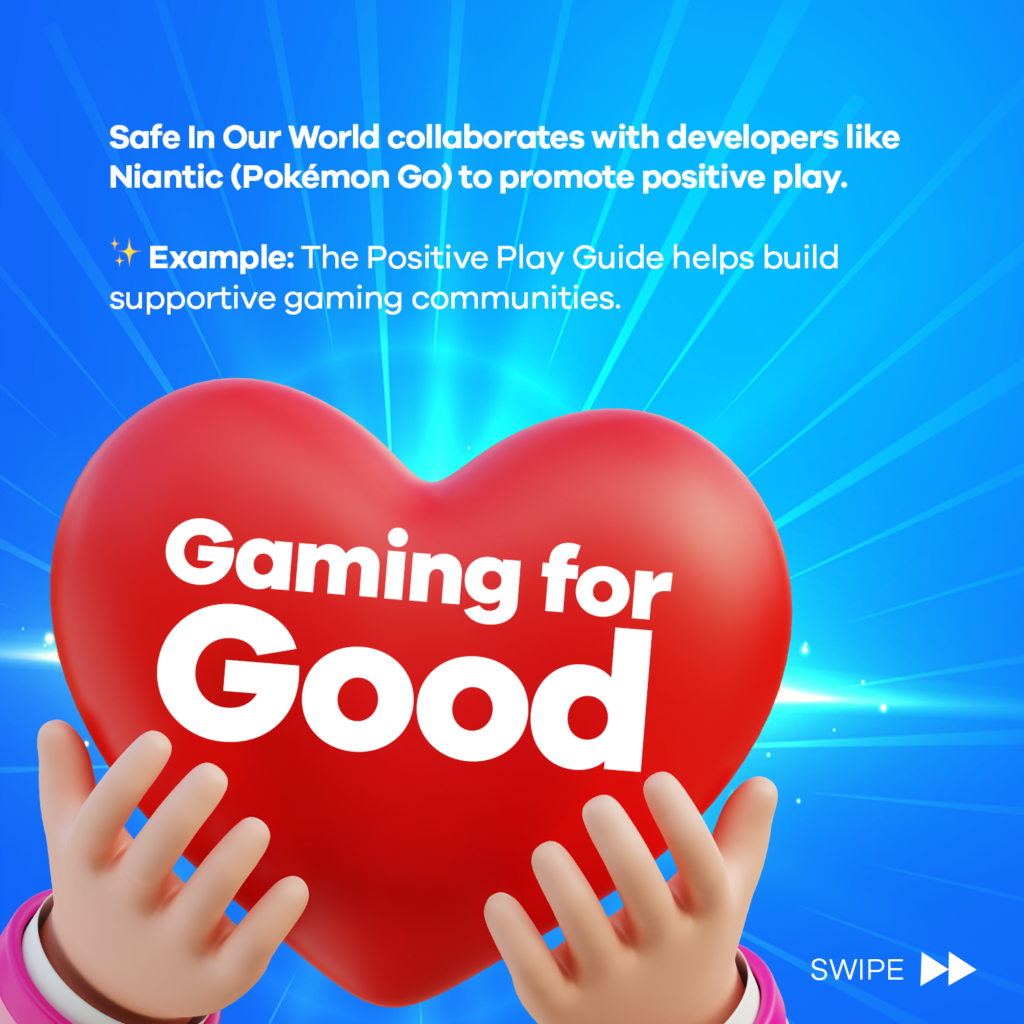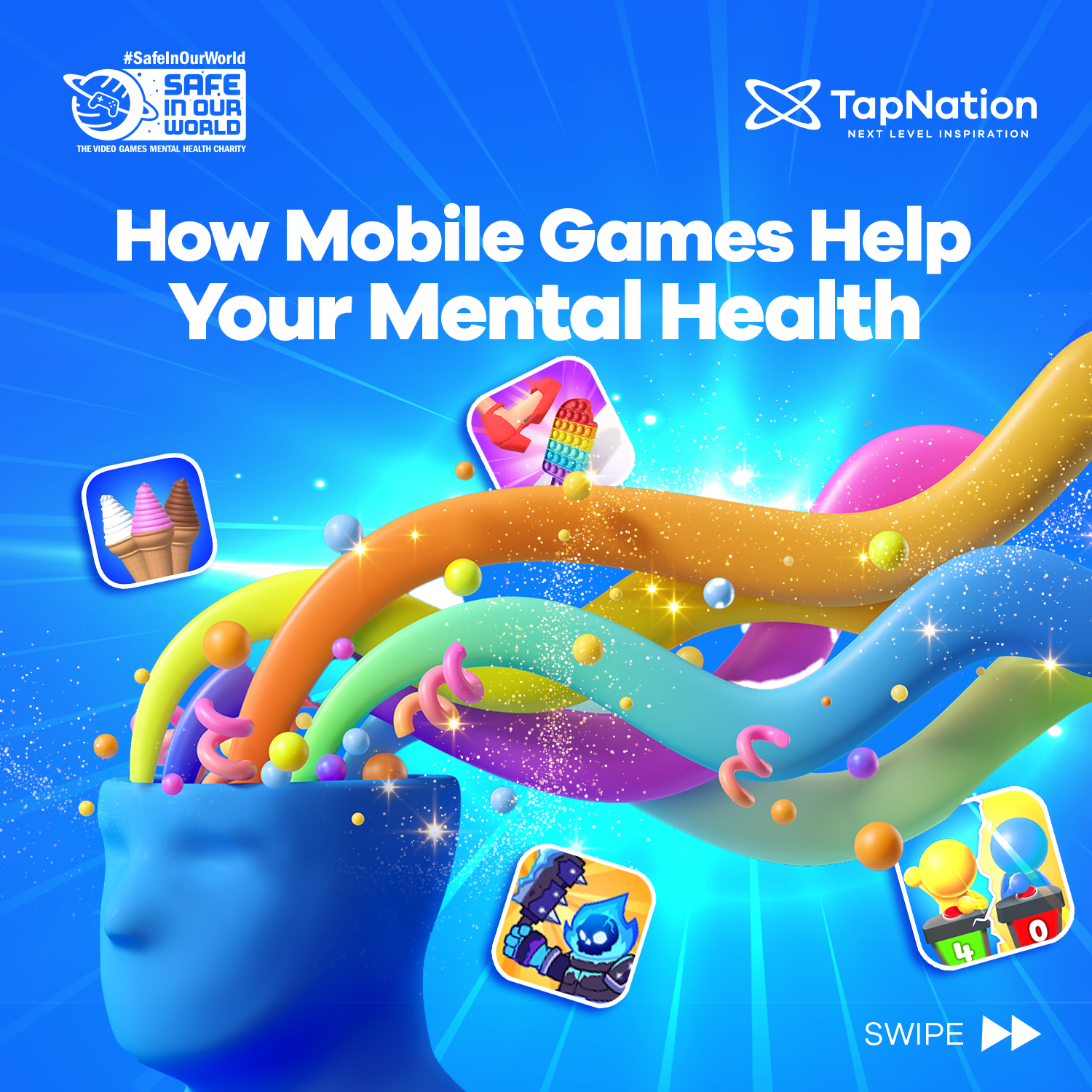
Philippe Grazina – Jan 28, 2025
In collaboration with Safe In Our World
Introduction: Gaming as a Connector
The gaming industry has seen explosive growth over the past few years, with mobile gaming carving out an impressive share. Following the COVID-19 pandemic, the number of global gamers quadrupled, with people collectively spending over 1 million hours gaming daily. The mobile gaming market is set to grow at a 6.06% compound annual growth rate (CAGR) from 2025 to 202
Popular opinion often focuses on gaming’s downsides, but research reveals a different perspective. Studies on gaming and mental health have found that video games can benefit our psychological well-being substantially. It goes beyond pure entertainment and serves as a valuable mental health tool. Games help improve cognitive functions and provide stress relief. They create chances for emotional growth and social bonds. The science-backed benefits of gaming show its therapeutic value and ability to build meaningful relationships that promote emotional wellness.
Beyond its sheer scale, gaming is also a profound way for families to connect. Titles like Pokémon Go encourage exploration, collaboration, and bonding. Hence proving that gaming can be more than just entertainment and passing time.
The Surprising Alliance: Gaming and Mental Health

While gaming has often been criticized for its potential downsides, emerging research highlights its mental health benefits. The World Health Organization (WHO) has acknowledged gaming’s role in promoting emotional well-being, especially when played responsibly.
Despite the popular notion that gaming is bad for our well-being, there is a potential for it to have positive effects and help improve our mental health. However, it’s essential to clarify that games are not substitutes for professional mental health therapies, such as Cognitive Behavioral Therapy (CBT). Instead, they serve as complementary tools that help players manage stress, build resilience, and foster emotional regulation. In this poignant article by Safe In Our World, Joe Donnelly, a Glasweigian writer mentions how video games played a pivotal role in their therapeutic journey. Inspired by Actual Sunlight, Neverending Nightmares, Hellblade: Senua’s Sacrifice, Celeste and Night in the Woods, games bought Joe comfort during challenging times and most importantly, nudged him towards couseling.
Positive Effects of Mobile Gaming on Mental Health
A. Stress Relief and Emotional Regulation
Games provide a much-needed mental break from daily pressures. Games like Finch combine elements of journaling and gameplay to help users manage anxiety and depression. Such experiences can also help players know how to track their internal states – in what’s called interoceptive awareness which is the ability to track their feelings and internal states. Incorporating this technique, Finch acts as your own personal self-care pet best friend. Though mindful goals and exercises, the game fosters mindfulness and emotional stability. Games such as these can be used as great tools to relieve stress stress, improve mood and manage emotional challenges
Gaming as a mindfulness practice
Games can be a great tool to handle emotions and manage stress. One of ways it can help is through regular mindfulness meditation. Players can reach a meditative state with games that work just like regular meditation. In this study, it was found that playing a casual video game, such as Flower, proved to be an effective strategy to de-stress. The results of the study also state that casual video games may benefit more students with their accessibility, compatibility
and popularity among this population.
Stress reduction through gameplay
Games can help people deal with stress. Research shows that cortisol levels decrease significantly after just 45 minutes of creative gaming activity. Games with calm, repeating patterns can give players:
- A sense of comfort through predictable patterns
- Better focus and concentration
- A stronger sense of emotions
- More engaging ways to handle stress
B. Cognitive Benefits and Skill Development
Mobile games do more than entertain—they sharpen the mind.They offer a wide array of cognitive benefits that extend far beyond mere entertainment. Recent studies have shed light on how these digital experiences can enhance various aspects of cognitive function and skill development.
Improved Problem-Solving Skills
Mobile games, particularly puzzle and strategy games, serve as excellent platforms for developing problem-solving skills:
- Games like “Portal” and “The Room” series challenge players to think critically and approach problems from multiple angles.
- Strategy games such as “Civilization VI” encourage players to analyze complex situations and make decisions with long-term consequences.
- These problem-solving skills often translate to real-world scenarios, enhancing analytical thinking in academic and professional settings.
Enhanced Creativity and Cognitive Functions
The interactive nature of mobile games can stimulate creativity and boost various cognitive functions:
- Open-world games like “Minecraft: Pocket Edition” allow for unlimited creative expression, fostering imaginative thinking.
- Games that require quick decision-making, such as “Fruit Ninja,” can improve cognitive flexibility and reaction times.
- Research also indicates that gaming can enhance visual attention and spatial cognition, skills that are valuable in fields like engineering and architecture.
Better Concentration and Focus
Contrary to the belief that games are merely distracting, many mobile games can actually improve concentration:
- Action games have been shown to enhance selective attention, allowing players to focus on relevant information while ignoring distractions.
- Games with increasing levels of difficulty, like “Lumosity,” are designed to improve sustained attention over time.
- The ability to maintain focus during gaming sessions often translates to improved concentration in academic and professional tasks.
Learning New Skills Through Mobile Gaming
Mobile games are increasingly being recognized as powerful educational tools:
- Language learning apps like “Duolingo” gamify the process of acquiring new languages, making it more engaging and effective.
- Historical strategy games can improve knowledge of world history and geography in an interactive format.
- Simulation games like “Kerbal Space Program” on mobile devices can teach complex concepts in physics and engineering in an accessible manner.
Transferable Skills to Real-Life Situations
The skills developed through mobile gaming often have practical applications in real life:
- Resource management in games like “SimCity BuildIt” can improve budgeting and planning skills.
- Multiplayer games foster teamwork and communication skills that are valuable in collaborative work environments.
- Quick decision-making in fast-paced games can enhance real-world problem-solving abilities, especially in time-sensitive situations.
Cognitive Benefits in Educational Settings
Recent research has highlighted the potential of mobile gaming in formal educational contexts:
- A comprehensive study published in the Journal of Research on Technology in Education (2023) found that game-based learning in K-12 settings led to significant improvements in student engagement and academic performance across various subjects.
- Mobile educational games have been shown to enhance student motivation, leading to increased time spent on learning tasks and improved retention of information.
- Teachers report that integrating mobile games into the curriculum can help address diverse learning styles and provide personalized learning experiences.
Long-Term Cognitive Effects
Emerging research suggests that the cognitive benefits of mobile gaming may have long-lasting effects:
- A study published in Computers in Human Behavior (2023) found that regular engagement with cognitive training games could mitigate age-related cognitive decline.
- Longitudinal studies are beginning to show correlations between early exposure to problem-solving games and improved cognitive flexibility in adulthood.
By leveraging these cognitive benefits, mobile gaming is proving to be not just a form of entertainment, but a powerful tool for mental development and skill acquisition. As technology continues to advance, the potential for mobile games to enhance cognitive functions and support learning is likely to grow, opening new avenues for education and personal development.
Did you know? The popular mobile game “Lumosity” was designed by neuroscientists to target specific cognitive functions through gameplay.
C. Social Connection and Combating Isolation

Gaming has emerged as a powerful medium for building and sustaining social connections. Research into gaming communities shows that online gaming has grown into something much bigger than just entertainment. Studies reveal that people who report depressive symptoms and less ground support are 40% more likely to build and keep social connections with other gamers.
Building meaningful relationships online
Gaming creates unique chances to connect meaningfully with others. This research delves into how boys who play online video games with friends at least monthly make up 77% of players. These connections run deep – players share personal stories, talk about life’s challenges, and create friendships that last years and even decades. Among many platforms, Discord, is one of the most popular gaming communication platforms, which has 150 million monthly users. This number only goes to show just how massive these social networks have become.
Community support systems in mobile gaming
Gaming communities work as vital support networks. For instance, the Stack Up intervention uses trained volunteers to provide mental health support through Discord. This program helped veterans reduce their anxiety and improve their coping skills.. These communities often act as informal support groups where players talk about life challenges such as:
- Stress and anxiety management
- Relationship problems
- Major life decisions
- Career choices
Cross-cultural connections and understanding
Gaming surpasses geographical and cultural boundaries. Social gaming became a vital way to stay connected during the COVID-19 pandemic. Research shows it helped people stay in touch with friends more than with family or co-workers. These virtual forums create unique opportunities for cross-cultural understanding. Specifically, gaming communities naturally bring together people from different backgrounds and places.
These relationships bridge both digital and physical spaces, creating lasting bonds:
- For neurodivergent individuals and people with disabilities, mobile games offer an accessible way to interact and foster friendships.
- Titles like Kinder World emphasize empathy and collaboration, creating safe spaces for players to connect emotionally.
- Statistics also indicate that many players use games to combat loneliness, highlighting their role in reducing social isolation.
Balancing Gaming for Positive Mental Health
While the benefits of gaming are evident, moderation remains key. Here are some tips for healthy gaming habits:
- Set Boundaries: Allocate specific times for gaming to prevent overindulgence.
- Diversify Activities: Balance gaming with hobbies, physical activity, and social interactions.
- Monitor Emotional Responses: Be mindful of how gaming impacts your mood and seek help if needed.
Gaming in Mental Health Initiatives
The potential of mobile gaming to support mental health has not gone unnoticed by developers and organizations. There’s a growing trend of leveraging the engaging nature of games to create tools and experiences specifically designed to promote mental well-being.
A. Mobile Gaming Designed for Well-Being
A new genre of games is emerging, focused explicitly on mental health and emotional resilience:
Sky: Children of the Light
Developed by thatgamecompany, “Sky: Children of the Light” is a prime example of a game designed to promote emotional well-being:
- The game encourages players to explore a beautiful, ethereal world while connecting with others.
- It emphasizes cooperation over competition, fostering a sense of community and shared purpose.
- The game’s serene environments and soothing soundtrack create a calming atmosphere, ideal for stress relief.
- Players report feeling more connected and emotionally uplifted after playing sessions.
Kinder World
“Kinder World,” developed by Lumi Interactive, takes a unique approach to mental health gaming:
- The game combines elements of a plant-care simulator with mindfulness exercises.
- Players nurture virtual houseplants while also engaging in self-care activities.
- Daily kind acts and gratitude practices are integrated into the gameplay, promoting positive mental habits.
- The game aims to create a gentle, supportive environment for players to practice emotional regulation and self-compassion.
These games demonstrate how carefully crafted gaming experiences can serve as effective tools for promoting mental health and emotional resilience.
B. Safe In Our World’s Initiatives

Safe In Our World, a mental health charity focused on the gaming industry, has been at the forefront of promoting mental health awareness:
Community Manager Training
- The organization offers specialized training for gaming community managers, equipping them with skills to:
- Recognize signs of mental health issues in community members
- Respond appropriately to mental health crises
- Create and maintain supportive, inclusive gaming communities
Mental Health Workshops
- Safe In Our World hosts regular workshops for game developers and industry professionals, covering topics such as:
- Integrating mental health themes responsibly in game narratives
- Designing games with player well-being in mind
- Implementing features that promote healthy gaming habits
Awareness Campaigns
- The organization runs campaigns to destigmatize mental health discussions within gaming communities.
- They provide resources and information to help gamers understand and manage their mental health.
C. Partnerships for Positive Play
Collaborations between mental health organizations and game developers are creating innovative approaches to promoting well-being through gaming:
Safe In Our World and Niantic Partnership
A notable example is the partnership between Safe In Our World and Niantic, the company behind popular augmented reality games like Pokémon GO:
- Together, they created the Positive Play Guide, a comprehensive resource for gamers and developers.
- The guide offers strategies for:
- Maintaining a healthy balance between gaming and other activities
- Fostering positive interactions within gaming communities
- Using games as tools for stress relief and social connection
- It also provides developers with guidelines for creating games that promote player well-being.
Impact of the Positive Play Guide
The Positive Play Guide has had a significant impact:
- Many game developers have incorporated its principles into their design processes.
- Gaming communities have used it as a framework for establishing community guidelines.
- It has sparked discussions about the role of games in mental health, leading to increased awareness and research in this area.
These initiatives demonstrate a growing recognition of the potential for mobile gaming to not only entertain but also actively contribute to mental health and well-being. As the field evolves, we can expect to see more innovative approaches to leveraging the power of gaming for positive mental health outcomes.
Conclusion
Mobile gaming is more than just entertainment—it’s a platform for emotional growth, social connection, and cognitive development. As we recognize its potential to support mental health, Safe In Our World demonstrates how gaming can transform lives for the better.
Let’s embrace gaming as a force for good while promoting responsible play. Explore their initiatives and discover how gaming can positively impact your mental health here.


